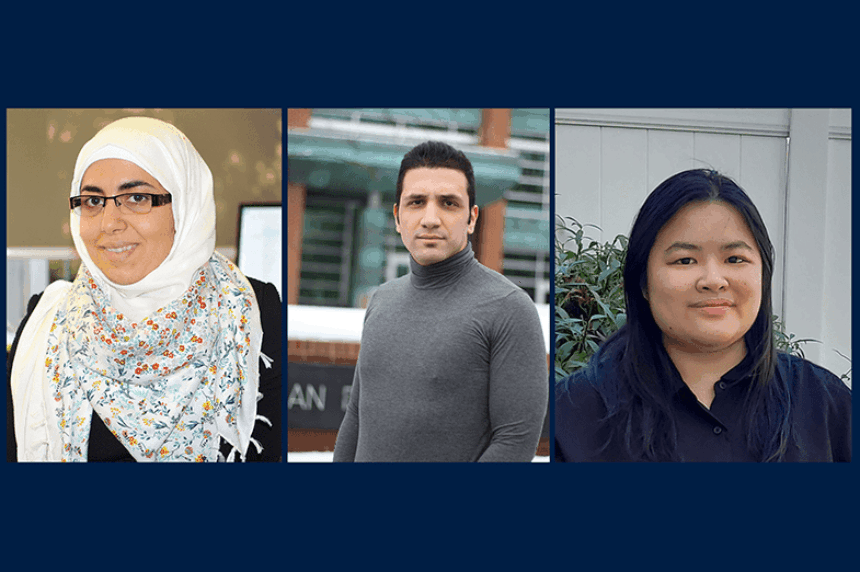June 02, 2021
Architecture graduate students earn Engineering for Change Research Fellowships

UNIVERSTY PARK, Pa. — Dima Abu-Aridah, Ali Ghazvinian and Tiffanie Leung, all graduate students in the Stuckeman School’s Department of Architecture, have been named 2021 Engineering for Change Research Fellows in the habitat sector.
Designed to prepare early career professionals to solve local as well as global challenges, the American Society of Mechanical Engineers (ASME) E4C Fellowship program provides a platform for the next generation of technical professionals to “reach their fullest potential” and advance the United Nations’ Sustainable Development Goals.
This year the Autodesk Foundation, which is the philanthropic arm of Autodesk, Inc., partnered with ASME to offer even more emerging professionals the opportunity to apply their technical research to solve some of the world’s most pressing social and environment issues. As such, nearly 650 applications from interested candidates in 80 countries were submitted for the program with 50 students and young professionals from 24 countries ultimately selected for the 2021 cohort.
An architect and urban planner from Jordan, Abu-Aridah is a doctoral student whose current research focuses on the planning and informal transformation of the built environment in refugee camps, with a focus on the context of her home country.
“My motivation to pursue [an E4C Fellowship] comes from studying and working in Jordan, a country that hosts a large number of refugees from the Middle East,” said Abu-Aridah. “In Jordan, there is a vital need to improve the development sectors, including the education, health care and housing sectors, so that those sectors can work to serve both the country’s citizens as well as the refugees.”
A native of Tehran, Iran, Ghazvinian is focusing his doctoral studies on computational design and is working on converting mycelium-based bio-composites to the architectural context in an interdisciplinary area. A researcher in the Form and Matter Lab (ForMatLab) within the Stuckeman Center for Design Computing, Ghazvinian is attempting to define a comprehensive framework for preparing nature-based materials to be used as an alternative for the traditional masonry materials in an affordable, repeatable and more sustainable way.
“I found the E4C Fellowship program as a fantastic opportunity to broaden and deepen my perspective for finding solutions to global programs, he said. “Learning from other people and their experiments within similar scenarios will help me in my journey, both academically and professionally.”
Leung just completed her first year in the master of science in architecture graduate program and has centered her research around round material improvements to earthbag construction systems and bag-making processes that can enhance builder empowerment.
“Motivated by the humanitarian application of earthbag construction in disaster recovery, I applied to E4C to gain some insight into the processes and strategies used in engineering for global development, which I want to apply to my own research,” said Leung. “This fellowship is also the perfect chance for me to connect with people outside of architecture and foster interdisciplinary relationships that could have an impact in my career in the future.”
Stuckeman School alumnus Julio Diarte, who graduated from Penn State earlier this month with his doctorate in architecture, was part of the E4C Fellowship cohort in 2020.
E4C is a nonprofit organization made up of engineers, technologists, designers, social entrepreneurs, non-governmental organizations and community advocates who are committed to improving the quality of life in communities around the world by facilitating the development of affordable, local appropriate and sustainable solutions to the most pressing social challenges. More about the fellowship program can be found at https://www.engineeringforchange.org/e4c-fellowship/.
For more Stuckeman School news, follow us on Twitter @StuckemanNews.
